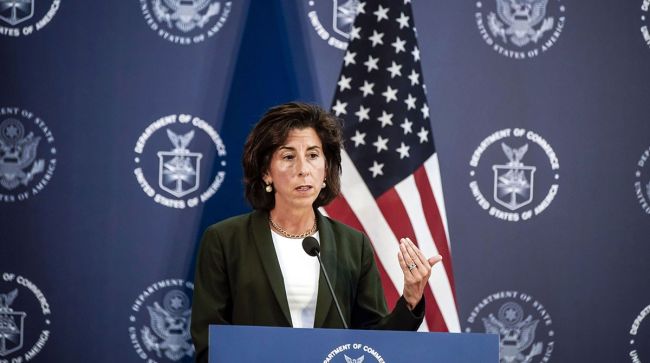The U.S. Commerce Department is pitching its landmark multinational pact to strengthen supply chains with 13 Indo-Pacific nations that together with America account for 40% of the world’s gross domestic product.
Commerce Secretary Gina Raimondo released Sept. 7 the 25-page “Indo-Pacific Economic Framework for Prosperity (IPEF) Supply Chain Agreement” that must be approved by each nation domestically before signed by representatives.
“By working toward finalization of this monumental agreement, the United States is taking an important step forward to fortify bonds with our partners throughout the Indo-Pacific,” Raimondo noted. “Working in lockstep, we will be prepared to best address our shared economic challenges together.”
She said the agreement is part of the Biden administration’s commitment to revitalize American manufacturing and strengthen critical supply chains.
Indo-Pacific Partners
Countries included in the “Indo-Pacific Economic Framework for Prosperity (IPEF) Supply Chain Agreement”:
- United States
- Australia
- Brunei
- Fiji
- India
- Indonesia
- Japan
- South Korea
- Malaysia
- New Zealand,
- Philippines
- Singapore
- Thailand
- Vietnam
The Department of Commerce and Office of the U.S. Trade Representative have held sessions with stakeholders for their input on the proposed agreement.
The Commerce Department will continue to provide regular updates and briefings to Congress and stakeholders “as IPEF partners work through their domestic processes to accept, adopt or ratify” the agreement.
The document is divided into 27 articles (topic areas). Its main focus is for the partner nations to embark on specific actions to strengthen IPEF supply chains by minimizing unnecessary restrictions on trade that affect its resilience, efficiency, productivity, sustainability, transparency, diversification, security, fairness and inclusivity.
The member nations must commit to having at least one focal point to encourage direct foreign investment into their markets. They also should have procedures for the normal release of perishable goods after required procedures have been met.
The nations should intend, as much as possible, to increase investment in long-term and cold-chain warehousing near or easily accessible to ports of entry while avoiding “discriminatory policies and procedures that limit warehousing options for imported goods.” Authorized transportation workers also should have government-facilitated access to sea, air and land ports of entry and related facilities (subject to domestic rules on travel documents and authorizations).
Another major milestone and accomplishment for the Biden-Harris Administration’s innovative approach to economic engagement. https://t.co/S9VgAkBYVw
— U.S. Commerce Dept. (@CommerceGov) September 7, 2023
The document also stipulates that each nation “intends to explore supply chain mapping approaches, including chain-of-custody protocols and utilization of production- and logistics-related data where appropriate and feasible, with the goal of improving supply chain transparency from raw materials to finished goods, with a particular focus on critical sectors and key goods.”
Member nations are to establish an IPEF Supply Chain Council with relevant senior central government officials as well as a supply chain crisis response network and labor rights advisory board.

Transport Topics’ Seth Clevenger, Michael Freeze and Mike Senatore dissect the new Top 100 list of the largest private carriers, including how fleets are adapting to this softened market. Tune in above or by going to RoadSigns.ttnews.com.
The agreement contains detailed actions all 14 countries should take to identify critical sectors/key goods that factor in the impact of a potential shortage on national security, public health/safety as well as ways to prevent significant economic disruptions. The nations should evaluate geographic factors, alternative suppliers, imports required to meet domestic demand, production capacity, interconnectedness with other critical key goods and dependence on a single supplier or geographic area.
Collaborating on cybersecurity is another area that could include developing standard procedures and sharing incident data about detected attacks targeting critical sectors and infrastructure. Parties also would be able to share incident responses (including collective responses from member nations) and remediation strategies.
“Each party intends to employ an evidence-based and data-informed approach to consider its supply chain vulnerabilities and to monitor import dependencies, prices (where appropriate and feasible) and trade volumes of its critical sectors or key goods,” the agreement states.
Parties can seek an emergency in-person or virtual meeting of the IPEF Supply Chain Crisis Response Network when expecting or responding to a disruption. The meeting must be held within 15 days of a request and should discuss the impact of a disruption, cause, expected duration, mitigation measures, affected economic sectors and assistance needed.
Once approved, the pact would be reviewed by all signatory nations every five years.






